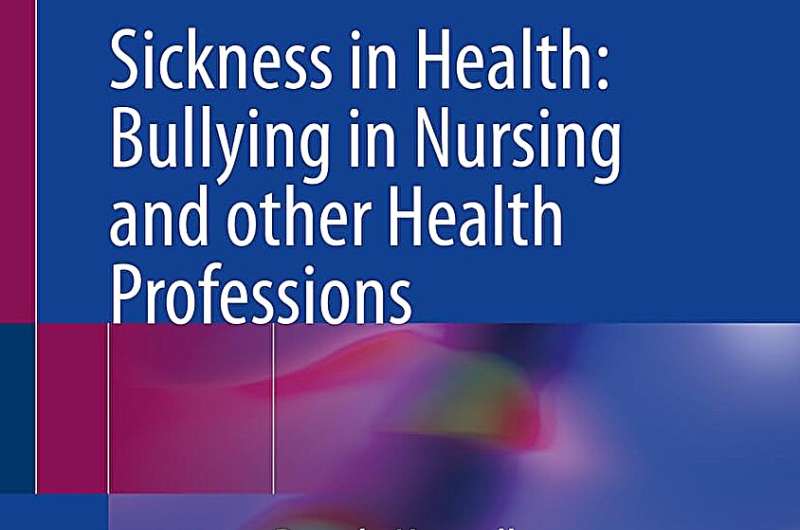This article has been reviewed according to Science X's editorial process and policies. Editors have highlighted the following attributes while ensuring the content's credibility:
fact-checked
trusted source
proofread
Sickness in health: When workplace bullying turns colleagues into foes

Health professionals are caring people. So they must make great colleagues, right? Not so, according to Brenda Happell, Professor of Mental Health at Southern Cross University reflecting on her own experiences of bullying in a new book.
Happell's successful career as a mental health nurse ended abruptly when she sacrificed the work she loved for the sake of her physical and mental health.
"It broke my heart leaving when and how I did. I simply couldn't take it anymore. I had to go. I felt like my life depended on it," she said.
Despite more than four decades of experience in health care and university settings, Professor Happell soon discovered the impacts of bullying do not disappear upon leaving a toxic environment. She knew she could not heal until making some sense of her experiences.
Her book "Sickness in Health: Bullying in Nursing and Other Health Professions" was the result of her determination to share experiences of workplace bullying. She knew she was not alone and sought out other health professionals—across medicine, nursing, social work, psychology and more—who were willing to share their stories with her.
"These 12 people, whom I call champions, shared so much with me. It was distressing to hear what happened to them and is still happening to some. Lives and relationships had been destroyed. How can health professionals behave this way? It still baffles me to this day," Professor Happell said.
This book goes beyond statistics to show how bullying derails careers and destroys lives. Professor Happell and "her champions" lost their love for the jobs that had meant so much to them, they lost confidence in their ability to do their jobs, and often believed they must have done something to deserve what was happening. Some left jobs or retired early to escape the torment.
As Professor Happell recounts in the book: "I loved my jobs. I loved the work, the variety, and the autonomy. The decision to leave was always hard and meant saying goodbye to much that was satisfying."
Jordan, a former nurse academic, expressed similar sentiments: "Work is such an essential part of what I do and who I am that it just isn't an option to coast along, only do what I have to and keep quiet in the background."
Understanding workplace bullying is not as straightforward as it seems. Not all bullies yell and scream. Subtle approaches are far more common. Micromanagement, changing goal posts, undermining, withholding resources and imposing unreasonable work demands are some examples. These tactics can be much harder to identify.
As Taylor, a mental health peer worker, describes, "You can see the obvious, prepare and take note of it, but it's what you can't see coming that will sideswipe you. That frightens me more."
Gathering the anecdotes gave Professor Happell plenty of time to reflect.
"Why does bullying at such a scale continue? Surely there are structures in place where it can be addressed and resolved. Unfortunately, this is not the case and certainly wasn't for the champions," said Professor Happell.
Rory, a medical practitioner, summed it up beautifully:
"If you don't have a good culture and strong leaders who will pull these people aside and say, 'That's not good enough here,' it can happen anywhere in any workplace. People don't have management training. They just get put into these positions."
"Nowhere to turn," is how many described their feelings amid the bullying storm. They had attempted to resolve bullying informally through direct communication or, more formally, via human resources (HR) departments and unions. Not only didn't this not help. It led to further bullying, exclusion and often ostracism.
"Very few people I've known have achieved any favorable resolution from HR. It is clear they are there to support management. If you're being bullied by management, you have no hope," said Professor Happell.
Clearly this points to broader organizational structures that at least condone these practices and, at worst, encourages them.
"Everything we know about workplace bullying in health points to toxic environments, unqualified and often unsuitable managers, HR departments supporting management and unions that seem powerless to do much at all," said Professor Happell.
"How can professionals practice safely and effectively in these circumstances? They can't. We hear time and time again about the shortage of health professionals. When will we stop eating our young and not so young? Something must give. Not only for the sake of health professionals, but for the public who rely on health services, and, indeed, sometimes their lives depend on them."
Unfortunately, there is no happy ending to this book. Professor Happell hopes it goes some way to helping health professionals to recognize the signs of bullying and see the need to support themselves and their colleagues. Others will hopefully see that they are not alone, and not to blame.
Most of all, Professor Happell said she hopes "it contributes to conversations and helps to change our understanding of what bullying is."
More information: Sickness in Health: Bullying in Nursing and other Health Professions. link.springer.com/book/10.1007/978-3-031-49336-2





















